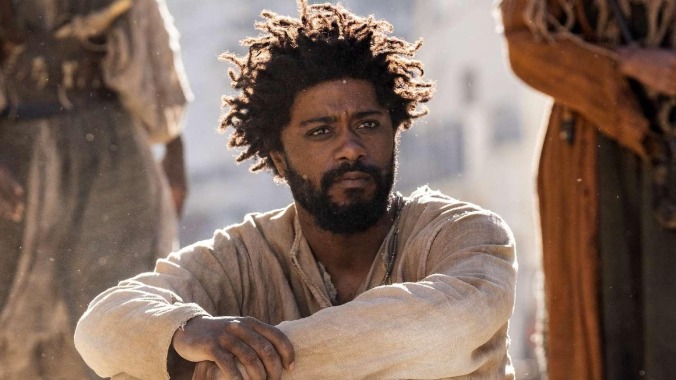The Book Of Clarence review: An adventurous homage to biblical epics
LaKeith Stanfield and Alfre Woodard star in director Jeymes Samuel's film, which fails to find a consistent path
Film Reviews The Book of Clarence
In The Book Of Clarence, writer and director Jeymes Samuel (The Harder They Fall) imagines a 13th apostle who lies his way into being a disciple of Jesus. Set in Jerusalem in the year 33, the film follows a charming small-time crook talented in the art of hustling. He’s not a believer in God, but rather someone who sees an opportunity to ride Jesus’ popularity for his own benefit. The premise is a fun sendup of classic bible movies like Ben-Hur (1959) and The Tenth Commandment (1956), and the film straddles the line between entertaining anachronism—modern performances and soundtrack and tongue-in-cheek humor—and respect for the religious framework. But it never fully commits to either stance, thus ending up an odd, albeit entertaining, mismatch of tones and themes.
Played with sly insouciance by LaKeith Stanfield, Clarence is first presented in a rambunctious chariot race alongside his friend Elijah (RJ Cyler) and against Mary Magdalene (Teyana Taylor). He loses the race, becoming indebted for a large sum of money, and has to pay it off within 30 days or face the wrath of Jedediah (Eric Kofi Abrefa). On the sidelines of this bit of trouble, Clarence continues to be enamored with Jedediah’s sister (Anna Diop), taking care of his elderly mother (Marianne Jean-Baptiste), while remaining estranged from his twin brother, Jesus’ true disciple, Thomas (also Stanfield). With the plot in motion and the players identified, Samuel sets out to present familiar storylines and characters—everyone from Jesus to John the Baptist to Pontius Pilate makes an appearance—with just a dash of playful lampooning.
The Book Of Clarence has so many familiar characters that it becomes like watching an extended episode of RuPaul’s Drag Race, with reveal after reveal. Samuel knows how to wring the most out of characters like Jesus, Mary, and Joseph. Almost every significant character is revealed in the same way: the film’s main characters talk about them, they are first shown in shadow, with their back to the camera or behind a wall or another character, until the big reveal with the appropriate soundtrack fanfare and a knowing look from the actors. It’s fun and it ramps up the melodrama of the story.
In one such scene, The Book Of Clarence hits its stride. Alfre Woodard adds much-needed gravitas and grandeur to the film, just by appearing as Mary, mother of Jesus. She spikes that seriousness with just a hint of playfulness, fully taking advantage of the wit inherent in declaring that she is indeed a virgin. Stanfield, as the ever-skeptical Clarence, becomes the audience surrogate facetiously asking all the questions that have crossed many people’s minds about this immaculate conception. The laughs come easily and the film’s entertainment value hits an apex.
Unfortunately, The Book Of Clarence never reaches that height again. Instead in its last hour the scale between earnest and spirited starts to shift towards the former. Samuel jettisons all the cheeky parody and farce, adding a familiar story about a hero’s redemption and their burgeoning belief in themselves. It’s respectful of the story’s religious origins but takes out almost all the fun. The audience is expected to believe that people can walk on water right after laughing about the merits of baptism.
The film hums along with nary a memorable moment. All the elements are there and the players are game, but something is off. What starts as an adventurous rendition of a tried-and-true genre of film becomes a paint-by-numbers exercise limping to its finale. As an homage to biblical epics of yesteryear, The Book Of Clarence doesn’t have enough grand drama or thrilling set pieces. As a spoof of such films, it loses its nerve and never goes for the full joke. And as a straightforward story of belief, it relies too much on familiar tropes. Thus it ends up being too little of this and that and not enough of its own.